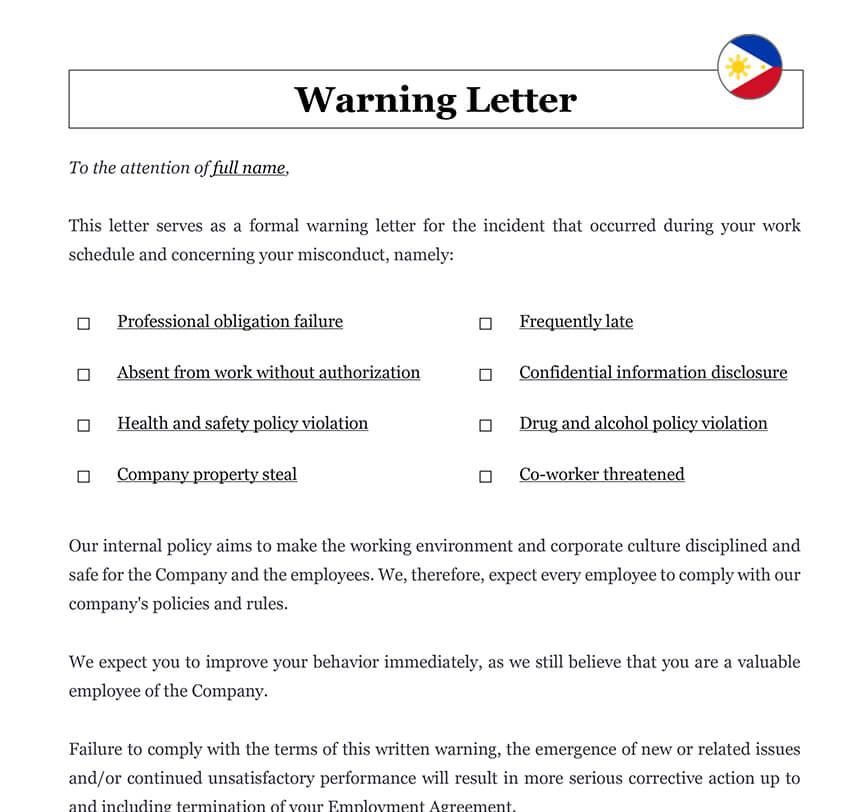Ready to use legal template
Drafted by experienced lawyers
Compliant with Filipino law
Ready to use legal template
Drafted by lawyers
Compliant with Filipino law
Learn more about Employee Warning Letter in Philippines
An Employee Warning Letter is a formal document issued by an employer to an employee who has violated company policies or failed to meet expected standards of conduct or performance. Its purpose is to address and document the issue, offering the employee an opportunity to improve their behavior or performance. The letter outlines the nature of the violation, expectations for improvement, and possible consequences if the behavior continues. In the Philippines, issuing an Employee Warning Letter is a critical step in the disciplinary process, ensuring compliance with labor laws and protecting the employer from potential legal disputes. Download our Employee Warning Letter, easy to edit in Word format, drafted by experts to be used in the Philippines.
Table of contents
-
What is an Employee Warning Letter?
-
Why Employee Warning Letter are important?
-
How to notify an employee of a warning?
-
How to write an effective Employee Warning Letter?
-
What are the legal requirements in the Philippines?
-
Can an employee contest a penalty in the Philippines?
-
How many warnings are necessary before a dismissal?
What is an Employee Warning Letter?
An Employee Warning Letter in the Philippines is a formal document that is issued by an employer to an employee who has engaged in unsatisfactory performance or behavior. The letter outlines the specific issue or problem, the consequences of continuing the behavior, and the steps the employee needs to take to improve.
The warning letter is typically used as a way to correct the issue and avoid disciplinary action. The letter serves as a documented record of the employee’s behavior, which can be used as evidence in legal proceedings if necessary. It is also a way to provide the employee with a clear understanding of the employer’s expectations and what needs to be done to improve.
In the Philippines, a warning letter should be clear, concise, and follow proper legal requirements. This includes providing the employee with a copy of the letter, allowing them the opportunity to respond, and ensuring that their rights are protected throughout the process.
Why Employee Warning Letter are important?
Employee Warning Letters are important in the Philippines for several reasons:
1. Improving Employee Performance: The purpose of a warning letter is to help employees improve their performance and behavior. It gives them a clear understanding of what is expected of them and what needs to be done to improve.
2. Documenting Employee Conduct: A warning letter is a documented record of an employee’s performance or behavior, which can be used as evidence in legal proceedings if necessary.
3. Preventing Future Issues: Employee Warning Letters serve as a deterrent for employees who may be considering engaging in inappropriate behavior or failing to meet performance expectations.
4. Maintaining a Positive Work Environment: Employee Warning Letters help maintain a positive work environment by addressing problematic behavior or performance issues promptly and fairly.
5. Protecting the Company: Employee Warning Letters protect the company’s interests by addressing and resolving issues before they escalate into more serious problems.
How to notify an employee of a warning?
To notify an employee of a warning in the Philippines, the following steps should be followed:
Step 1. Schedule a Meeting
Schedule a private meeting with the employee to discuss the issue and present the warning letter. This allows the employee to hear the concerns in person and respond to any questions they may have
Step 2. Provide a Copy of the Warning Letter
Give the employee a copy of the written warning letter, which should clearly state the reason for the warning, the consequences of not correcting the behavior, and the steps the employee should take to improve.
Step 3. Explain the Concerns
During the meeting, take the time to explain the concerns in detail and provide specific examples of the problematic behavior or performance issues.
Step 4. Allow the Employee to Respond
Listen to the employee’s perspective and allow them to respond to the concerns. Encourage the employee to ask questions and provide their own feedback.
Step 5. Follow Up
Schedule a follow-up meeting to discuss the employee’s progress and determine whether the issue has been resolved.
ℹ️ In case of lack of performance you can, with your warning letter, provide an Employee Performance Evaluation to give more details on the points to improve.
How to write an effective Employee Warning Letter?
Here is a step-by-step guide to help you write an effective Employee Warning Letter in the Philippines:
1. Gather information: Before you start writing, gather all relevant information about the situation that led to the need for a warning letter. This could include details about the employee’s performance or behavior, relevant company policies, and any previous conversations or warnings that have taken place.
2. Identify the issue: Clearly state the issue that the employee is being warned about. Be specific and objective, and avoid making assumptions or accusations.
3. Explain the consequences: Let the employee know what will happen if the issue is not addressed. For example, if an employee is consistently late for work, you may explain that continued tardiness could result in disciplinary action, up to and including termination of employment.
4. Provide guidance: Offer the employee guidance on how to improve their behavior or performance. Provide specific examples of what is expected and what steps the employee can take to correct the situation.
5. Offer support: Let the employee know that you are there to support them and that you want to see them succeed. Offer to provide additional training or resources if needed.
6. Document the letter: Keep a copy of the warning letter in the employee’s file, along with any other relevant documentation. This will provide a record of the situation in case further action is necessary.
7. Sign and date the letter: Make sure that the letter is signed and dated, and that the employee receives a copy.
What are the legal requirements in the Philippines?
In the Philippines, the legal requirements for Employee Warning Letters are governed by the country’s labor laws and regulations, including the Labor Code and the implementing rules and regulations issued by the Department of Labor and Employment (DOLE). Here are some of the key legal requirements to keep in mind when writing an Employee Warning Letter:
| ➤ Due process: Employees have a right to due process, which means they should be given an opportunity to explain their side of the story before any disciplinary action is taken. A warning letter should be issued after the employee has been given an opportunity to respond to the allegations. |
| ➤ Fair and impartial treatment: The warning letter should be fair and impartial, and should not discriminate against the employee based on their gender, race, religion, or other protected characteristic. |
| ➤ Specificity: The warning letter should clearly state the issue that the employee is being warned about and the evidence that supports the allegations. |
| ➤ Progressive discipline:The warning letter should follow a progressive discipline process, starting with a verbal warning, followed by a written warning, and escalating to more serious disciplinary action if necessary. |
| ➤ Retention of records: Employers are required to keep records of all disciplinary actions, including warning letters, for a specified period of time. |




